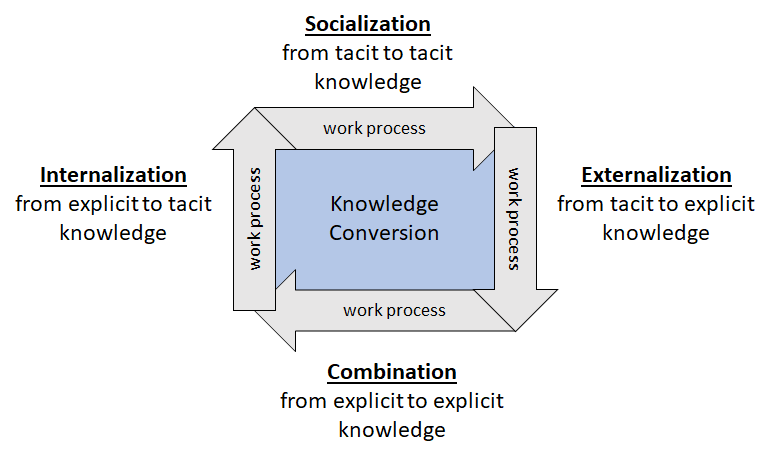
Knowledge Conversion
In [2] Polanyi writes "I shall reconsider human knowledge by starting from the fact that we can know more than we can tell". In [2] the writers use his distinction between tacit knowledge and explicit knowledge. Tacit knowing is personal, context-specific, and therefore hard to formalize and communicate. Explicit or "codified" knowledge refers to knowledge that is transmittable in formal, systematic language.
In [1] The writers consider the 2 types of knowledge: Tacit and Explicit knowledge, as mutually complementary entities.
Human knowledge is created and expanded through social interaction between tacit knowledge and explicit knowledge. It is an interaction
between individuals e.g. when people work together in work processes.
This leads to 4 different modes of knowledge conversion:

Based on the results of the previous steps "Process Analysis" and "Knowledge Identification" we can follow the work processes and the
knowledge conversions that take place in relation to the knowledge that has the focus.
Organizational knowledge creation is a continuous and dynamic interaction between different modes of knowledge conversion.
References:
- The Knowledge-Creating Company - How Japanese Companies Create the Dynamics of Innovation
Ikujiro Nonaka & Hirotaka Takeuchi - Oxford University Press 1995 - The Tacit Dimension
Michael Polanyi - Doubleday & Company 1966
Externalization
From Tacit to Explicit knowledge conversion
Externalization is a process of articulating tacit knowledge into explicit concepts.
It is a quintessential knowledge creation process in that tacit knowledge becomes explicit, taking the shapes of metaphors,
analogies, concepts, hypotheses, or models. The externalization mode of knowledge conversion is typically seen in the
process of concept creation and is triggered by dialogue or collective reflection.
Combination
From Explicit to Explicit knowledge conversion
Combination is a process of systemizing concepts into a knowledge system. This mode of knowledge conversion involves
combining different bodies of explicit knowledge. Individuals exchange and combine knowledge through such media as
documents, meetings, telephone conversations, or computerized networks. Reconfiguration of existing information
through sorting, adding, and categorization of explicit knowledge can lead to new knowledge.
Internalization
From Explicit to Tacit knowledge conversion
Internalization is a process of embodying explicit knowledge into tacit knowledge. When experiences through socialization,
externalization, and combination are internalized into individuals' tacit knowledge bases in the form of shared mental
models or technical know-how, they become valuable assets.
For organizational knowledge creation to take place, however, the tacit knowledge accumulated at the individual level
needs to be socialized with other organizational members, thereby starting a new spiral of knowledge creation.